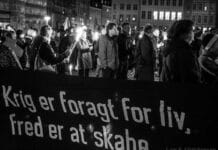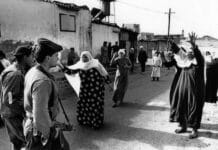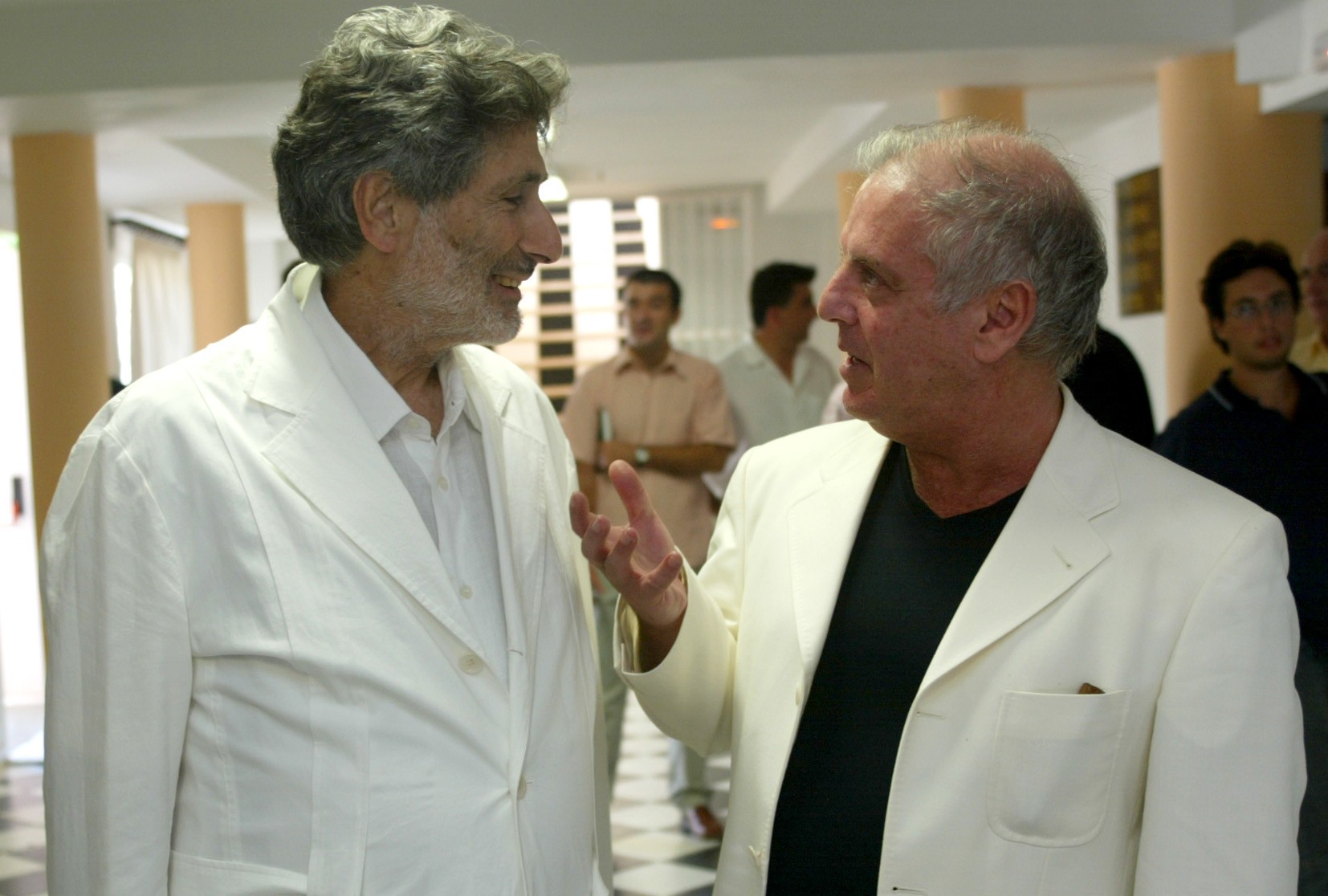
Materiale om Edward Saids politiske kamp for en palæstinensisk stat, artikler om litteraturvidenskab og musikkritik, samt debat om ‘Orientalisme’.
Indhold
- Forord / Foreword
- Websites
- Artikler på dansk
- Articles in English
- Bøger på dansk
- Books in English
- Interviews og artikler / Interviews and articles
- Nekrologer / Obituaries etc.
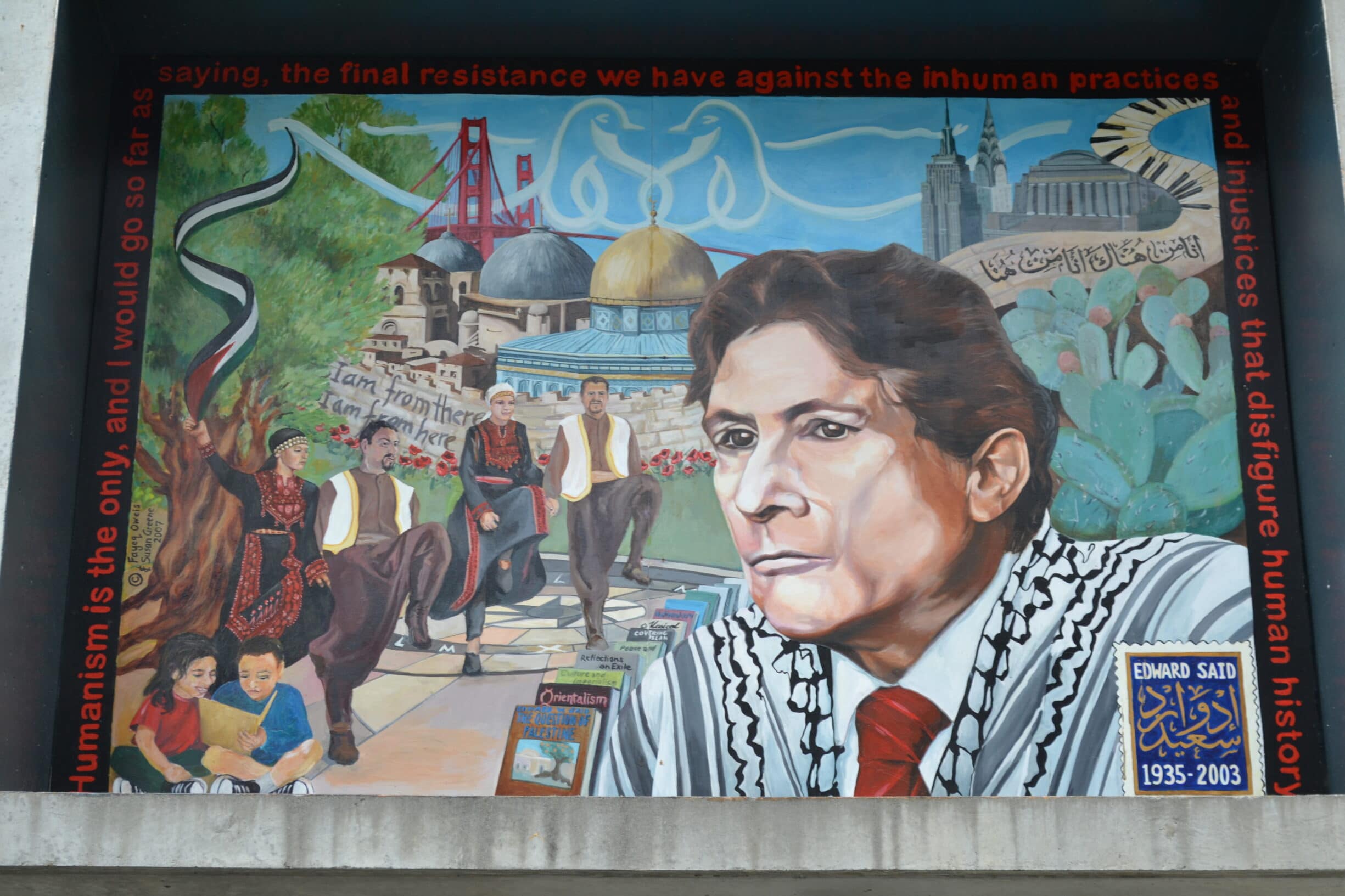
Forord
Edward Said døde d. 25. september 2003 af kræft. Vi har her samlet en række artikler og sites. Hovedvægten er lagt på hans politiske kamp for en palæstinensisk stat, men der er også medtaget artikler fra hans litteraturvidenskabelige og musikkritiske virke. Plus debat om hans indflydelsesrige bog Orientalisme. For dem, der er interesserede i hans værker fra før internetalderen, kan der søges i bibliografien Edward W. Said: A Bibliography (online at Internet Archive).
Foreword
Edward Said died of cancer on the 25th of September 2003. We have made a collection of articles and sites. The collection mainly cowers his political struggle for a Palestinian state, but there are also examples of his literary research and music critical works + about his book ‘Orientalism’. For those interested in his works before the internet age, look up the bibliography Edward W. Said: A Bibliography (online at Internet Archive).
Poul Mikael Allarp
Påbegyndt oktober 2003.
Revideret af Bjarne A. Frandsen, december 2020
(specielt ifm. debatten om bogen Orientalisme).
Sites
Wikipedia, the free encyclopedia
Al-Ahram Weekly Online
Edward Said (1935-2003) (No. 657, 25 September – 1 October 2003; online at Internet Archive).
Links til articles by and about Edward Said published in Al-Ahram Weekly Online.
Leksikon for det 21. århundrede
The Nation
Edward W. Said
Short biography and selected articles.
Om Edwards Saids Orientalisme
Site med bibliografi, anmeldelser, Said-artikler, citater mv.; online at Internet Archive.
Tapani Lausti’s Homepage
Edward Said (1935-2003)
Articles and obituaries about Edward Said.
ZNet
Edward Said (online at Internet Archive).
Some obituaries and an archive of all Edward Saids articles at ZNet.
Artikler på dansk af Edward Said
Gaia
Hvad Israel har gjort (nr. 37, sommer 2002, s. 4-7). P.t. ikke online.
“Israel kæmper mod terrorisme og for sin ret til at eksistere – denne påstand har fået status af en absolut sandhed. Men det er den palæstinensiske civile befolkning, der er ofrene for de israelske angreb, hvis sigte samtidig har været at ødelægge de palæstinensiske nationale institutioner. Det grundlæggende problem er, at Israel aldrig har accepteret palæstinensernes ret til en egen selvstændig stat. Med mindre Israel accepterer denne ret, vil “fred” blot betyde at palæstinenserne må opgive at kæmpe mod israelsk kontrol.”
Information
De ulykkelige helte (23. august 2002).
“Tegneseriernes traditionelle superhelte har ingen plads i de politiske tegneserier. Her fortælles alvorlige historier med stærke, overbevisende virkemidler og virkelige skæbner i hovedrollerne. ‘Ingen har formået at formidle den forfærdelige og håbløse tilstand i Gaza bedre end tegneren Joe Sacco’.”
Selvmordsbomber straffer to folk (19. juni 2002).
“Det palæstinensiske folk skal hverken regne med Arafat, USA, den arabiske verden, Europa eller Israel.”
Ti års bluff, ti års lidelser (23. marts 2002).
“Passende indrømmelser til palæstinensernes årtier lange lidelse og de enorme menneskelige omkostninger ved Israels destruktive politik er de eneste mulige og retfærdige rammer for at nå en forhandlingsløsning.”
Israel er endt i en blindgyde (29. december 2001).
“Moralsk legitimitet vil snart blive afkrævet af Israel, efterhånden som besættelsen kommer i stadig øget fokus for verdens opmærksomhed, og flere og flere israelere indser, at der ikke findes nogen muligheder for at fortsætte den 35 år lange besættelse i det uendelige.”
Islam og Vesten er falske feltråb (18. september 2001).
“USA’s internationale forståelse lader måske nok meget tilbage at ønske, men hvad, der især er deprimerende, er, hvor ringe en indsats, USA har gjort for at forstå sig selv.”
På samme plet jord (23. december 2000).
“Hvorfor kan israelerne ikke indse, at en brutal politik over for arabere i en del af verden, der rummer 300 mio. arabere og 1,2 mia. muslimer, ikke vil gøre den jødiske stat mere sikker?”
Oslos endeligt (4. november 2000).
“En fred i Mellemøsten kan kun opnås mellem ligeværdige parter – når den militære besættelse er slut.”
Krigens dilemma (15. maj 1999).
“En dybt anti-demokratisk logik er på spil. Enten er man for NATO og dermed vestlige ideer. Eller også støtter man den slaviske civilisation. Men det er en falsk karikatur af virkeligheden, skriver den palæstinensiske forfatter, Edvard Said. Ingen moralske valg er så enkle.”
En falsk følelse af fred (23. januar 1999).
“Efter at den israelske regering er brudt sammen som følge af Wye-aftalen, er det på tide at spørge sig selv, om hele den proces, der indledtes i Oslo i 1993, er det rette instrument for fred mellem israelere og palæstinensere.”
En morgen var min jord væk (30. april 1998).
“Landsbyerne på Vestbredden bærer vidnesbyrd om daglige tragedier med jord, der bliver eksproprieret, marker, der bliver pløjet ned med bulldozer, huse, der bliver revet ned.”
Det latente amerikanske araberhad (24. februar 1998).
“Den morbide, nærmest tvangsmæssige følelse af frygt og had over for araberne har været et konstant tema i amerikansk udenrigspolitik siden Anden Verdenskrig.”
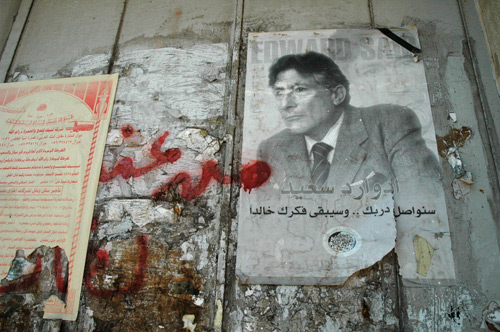
Articles in English by Edward Said
Al-Ahram Weekly
Imperial perspectives (Issue 648, 24 July, 2003).
“The distortions of imperial perspectives produce further distortions in Middle Eastern society that prolong suffering and induce extreme forms of resistance.”
American Zionism – The real problem (1) (Issue 500, 21 November, 2000) + More on American Zionism (2) (Issue 502, 5 October, 2000) + More on American Zionism (3) (Issue 506, 2 November, 2000).
“In my opinion, the role of organised Zionist groups and activities in the United States has not been sufficiently addressed … [the] US policy is in effect dominated, if not completely controlled, by a small minority of people whose views about Middle East peace are in some way more extreme than even those of the Israeli Likud.”
All the articles online at Internet Archive.
Se også under Sites above.
CounterPunch
Naguib Mahfouz and the cruelty of memory (December 16, 2001).
“Mahfouz is now ninety years old, nearly blind, and, after he was physically assaulted by religious fanatics in 1994 …”
Suicidal ignorance (November 18, 2001).
“By now, at least, it should be clear: the US just doesn’t get it. Time for a change of policy.”
Middle East Information Center
Zionism from the standpoint of its victims (1979).
Extract from the book: The Edward Said Reader (See Books in English)
Miftah
Dignity, solidarity and the penal colony (September 27, 2003).
Edward Said evaluates the situation in Palestine and the Middle East and the attitude in the USA and Europe towards the Arab World. [An Excerpt from The Politics of Anti-Semitism, edited by Alexander Cockburn and Jeffrey St. Clair.
The Nation
A configuration of themes (October 30, 2003).
This essay was Edward W. Said’s first piece for The Nation from the magazine’s May 30, 1966, issue. It’s a review of Poets Of Reality: Six Twentieth-Century Writers. By J. Hillis Miller (Harvard University Press).
The clash of ignorance (October 22, 2001).
Critique of Samuel Huntington’s article The Clash of Civilizations? (Foreign Affairs, Summer 1993): “Labels like ‘Islam’ and ‘the West’ serve only to confuse us about a disorderly reality.”
New Left Review
The desertion of Arafat (Issue 11, September-October 2001).
“As pressures mount upon the Palestinians and Israel continues its drive to put down the second Intifada, what kind of leadership does the PNA provide? Excoriating its irresponsibility and corruption, Edward Said issues a call for Arafat’s departure.”
America’s last taboo (Issue 6, November-December 2000).
“The Palestinian uprising and the blackout of its human and geographical realities by the US media. Edward Said looks at the power of the Zionist lobby in American public life, and warns of the fatal blindness of the PLO and Arab world towards it.”
REDS – Die Roten
“Islam” and “the West” are inadequate banners (16 September 2001).
“The United States may too often have failed to look outside but it is depressing how little time is spent trying to understand America.”
Bøger på dansk
Uden sted: Erindringer. Oversat af Claus Bech (Forlaget Vandkunsten, 2006, 388 s.).
Anmeldelse:
Det fraværende centrum, af Lotte Folke Kaarsholm (Information, 30. november 2006).
Om Edward Said Orientalisme (Samfundslitteratur.dk/orientalisme/; online på Internet Archive). Said-artikler, Om Said, Om Orientalisme i videnskab, kunst, litteratur og musik, Postcolonial teori.
Orientalisme: Vestlige forestillinger om Orienten. Oversat af John Botofte (Roskilde Universitetsforlag, 2002, 426 s.). Se FagBogInfo + Wikipedia.org: Orientalism (book): “Orientalism is a 1978 book by Edward W. Said, in which the author studies the cultural representations that are the bases of Orientalism, which Said defined as the West’s patronizing representations of ‘The East’ …”
Anmeldelser mv.:
Den intellektuelle i aktion, af Henning Goldbæk (Information, 10. maj 2002).
Den evige outsider, af Marcus Rubin (Politiken, 4. maj 2002)
Den evige araber, af John Botofte (Kronik i Politiken, 27. april 2002).
“Hævntørst, vellevned og religiøs fanatisme. Vestens fantasier om Orienten er kulørte. Og billedet af den islamiske kultur er ikke blevet bedre efter 11. september. Kronikøren har oversat Edward Saids Orientalisme til dansk.”
30 år med Orientalism (Dansk Sociologi, årg.20, nr.3, oktober 2009, 147 s.). Med artikler af Morten Valbjørn (s.11-31), Dietrich Jung (s.33-50), Mehmet Ümit Necef (s.51-76) og Jørgen Egholm Feldt (s.77-93) + review essays af Poul Pedersen, Jakob Skovgaard-Petersen, Thomass Hoffmann og Niels Brimnes (s.97-147).
Se også artikel af redaktører Jakob Egholm Feldt og Morten Valbjørn: Den uafsluttede 30-årskrig (Information, 4. december 2009).
Debate and reviews:
Orientalism (book) (Wikipedia.org). “Orientalism is a 1978 book by Edward W. Said, in which the author studies the cultural representations that are the bases of Orientalism, which Said defined as the West’s patronizing representations of ‘The East’ …”
Er orientalisterne orientalister? (pdf). Af Jakob Skovgaard-Petersen (Dansk Sociologi, årgang 20, nr.3, 2009, s.113-125). Anmeldelse af Robert Irwin: Af begær efter viden: Orientalisterne og deres fjender (Forlaget Vandkunsten, 2008) + Ibn Warraq: Defending the West: A Critique of Edward Said’s Orientalism (Prometheus Books, 2007).
Tredive år efter – refleksioner i anledning af Edward Saids Orientalism (pdf). Af Niels Brimnes (Dansk Sociologi, årgang 20, nr.3, 2009, s.137-147). “… her kan to ting konstateres: 1) Det er kritikerne af Orientalism, der har initiativet og fører ordet, og 2) tonen er lige så skarp og polemisk, som den plejer at være.”
Orientalism and ahistoricism. By Kenan Malik (Pandaemonium, May 2, 2021). “[This is] a short part of my original critique of Said’s Orientalism from my 1996 book The Meaning of Race. It is part of a much longer critique, but gets to the essence of some of disagreements.”
Orientalism and its afterlives. By Vivek Chibber (Catalyst: A Journal of Theory and Strategy, Vol.4, No.3, Fall 2020). “Edward Said’s Orientalism is one of the most influential books of the past fifty years … But even while it castigated the imperial project, the book gravely weakened the intellectual resources for analyzing it and, even more, for overturning it.”
Also online at Jacobin (December 24, 2021).
Capitalism and Orientalism. By Rena Jackson (Jacobin, March 1, 2019). Review of Bashir Abu-Manneh (ed.), After Said: Postcolonial Literary Studies in the Twenty-First Century (Cambridge University Press, 2019, 222 p.). “A new book examines the work of Edward Said in the light of Marxism, showing why imperialism can’t be understood in terms of culture alone.”
Karl Marx on India: An assessment, Part I. By Fakrul Alam (The Daily Star, December 29, 2018) + Part II (January 5, 2019). “I would like to end by saying that Marx on India is very illuminating and relevant for us, despite the blind spots in his vision. And so is Said on Orientalism, despite the blind spots he may have about Marx’s position in the Orientalizing tradition.”
A critique of “Orientalism” through the spirit of Marx (Workers’ Liberty, 17 June 2014). “Edward Said’s 1978 book Orientalism is a retort to his conceptualisation of a dual camp schema of the world. It effectively inverts this dual camp but with a method devoid of class politics.”
Orientalism in reverse. By Gilbert Achcar (Radical Philosophy, Issue 151, September-October 2008, p.20-30). “My object here is to sketch the evolution and meanderings of those among the post-1979 crop of French Orientalists who succumbed to ‘Orientalism in reverse’.”
Before and after Said. By Maya Jasanoff (London Review of Books, Vol. 28, No.11, 8 June 2006). Review of Robert Irwin, For Lust of Knowing: The Orientalists and their Enemies (Allen Lane, 2006). Se også anmeldelse af Niels Brimnes: Orientalisme – igen! (pdf) (Kontur, nr.18, 2008, s.167-168)
Critical notes on Edward Said. By Irfan Habib (International Socialism, Issue 108, Autumn 2005, p.129-136). “One, central, claim of the book is that that all western scholarship dealing with Asia and North Africa (the orient) since the time of the Ancient Greeks, including the work of Marx, suffers from the same irredeemable, invalidating prejudice, ‘Orientalism’. But can this claim be justified? Irfan Habib argues not.“
‘Orientalism’ and its critics (pdf). By Fred Halliday (British Journal of Middle Eastern Studies, Vol.20, No.2, 1993, p.145-163). “This debate has now raged for fifteen years, has generated a great deal of writing and fire, and is by no means over, not least because of developments since the mid-1970s.”
Orientalism and Orientalism in reverse. By Sadik Jalal al-Azm (Khamsin, Issue 8, 1981, p.5-26; online at Matzpen.org). “Said’s accusation that Marx subscribed to the basic Orientalist idea of the superiority of the West over the East seems to derive plausibility only from the ambiguity underlying his own discussion of this matter.” See also Moshé Machover’s obituary of Sadik Jalal al-Azm: Immeasurable loss (Weekly Worker, Issue 1135, 15 December 2016).
Se også:
Om Edwards Saids Orientalisme (Orientalisme.dk; online på Internet Archive). Nedlagt site med bibliografi, anmeldelser, Said-artikler, citater mv.
Critical notes on postcolonial theory. By Martin Thomas (Workers Liberty, 31 December 2023). “A common thread is the replacement of social and economic class as an axis of analysis and struggle by the axes of colonial/ decolonial, Indigenous/ settler, etc. In some ways it recapitulates what was called “Third-World-ism” in the 1960s.”
Marxism and post-colonial theory (Marxist Left Review, Issue 18, Winter 2019). “Sagar Sanyal argues that post-colonial theory is an inadequate theoretical and political response to the horrors of colonialism.”
Marxism and the future of postcolonial theory. By Pranav Jani (International Socialist Review, Issue 92, Winter 2014, p.105-121). Review of Vivek Chibber, Postcolonial Theory and the Specter of Capital (Verso, 2013, 320 p.). “My aim in this review, therefore, is to present and assess Chibber’s book for readers both familiar and unfamiliar with the field.”
The limits of postcolonial criticism: The discourse of Edward Said. By E. San Juan, Jr. (Against the Current, Issue 77, November-December 1998). “The anti-Marxism of postcolonial theory may be attributed partly to Said’s eclecticism, his belief that American left criticism is marginal, and his distorted if not wholly false understanding of Marxism …”
Marx on India: A clarification. Chapter 5 in Aijaz Ahmad: In Theory: Classes, Nations, Literatures (Verso, 1992, p.221-242; online at Maximum Red). “[Said] detaches a certain passage from its context, inserts it into the Orientalist archive and moves in different, even contradictory, directions.”
Den intellektuelles ansvar: Reith Forelæsningerne 1993. Oversættelse Lars Bonnevie (Roskilde Universitetsforlag, 2002, 131 s.).
(Tidligere udgave: Gyldendal, 1996, 130 s.).
Anmeldelser:
Den intellektuelle i aktion, af Henning Goldbæk (Information, 10. maj 2002).
Aktuel, anbefalelsesværdig litteratur, af Rune Engelbreth Larsen (Humanisme.dk, udateret).
Books in English
The world of Edward Said. By Esmat Elhalaby (Boston Review, May 13, 2021). Review of Timothy Brennan, Places of Mind: A Life of Edward Said (Farrar, Straus and Giroux, 2021, 439 p.). “Brennan’s book is a rich intellectual history, summarizing the content of Said’s major works, tracing the conditions of their creation, and mapping their influence. In detailing how specific conversations and locations stimulated his writing, and discussing the nature of Said’s unpublished poetry, fiction, and essays, Brennan breathes new life in a crowded field of Said studies.”
After the last sky: Palestinian lives. Photographs by Jean Mohr (Faber and Faber, 1986, 174 p.).
Beginnings: intention and method (The Johns Hopkins University Press, 1978, 1975, 414 p.).
Blaming the victims: spurious scholarship and the Palestinian question. Edited by Edward W. Said and Christopher Hitchens (Verso, 1988, 296 p.).
Covering Islam: how the media and the experts determine how we see the rest of the world (Pantheon Books, 1981, 186 p.). New Rev. ed. with a new introduction (Vintage, 1997, 200 p.).
Culture & imperialism (Vintage, 1994, 444 p.).
On the role of culture in 19th century and the early 20th century colonial policy.
Culture and resistance: conversations with Edward W. Said. By David Barsamian (South End Press, 2003, 193 p.). New edition 2019 (Haymarket Books).
Se review of David Finkel: A voice of resistance revisited (Against the Current, Issue 205, March-April 2020).
The Edward Said reader. Edited by Moustafa Bayoumi and Andrew Rubin (Granta, 2001, 472 p.).
Essays and artikles by Edward Said from 1966 – 1999 on literature, literature critigue og the Middle East. See excerpt: Zionism from the standpoint of its victims (pdf) (p.7-57) (Middle East Information Center).
The end of the peace process (Granta Books, 2002, 418 p.).
The end of the peace process: Oslo and after (Granta, 2000, 345 p.).
Freud and the non-European. With an introduction by Christopher Bollas, and a response by Jacqueline Rose (Verso, 2003, 84 p.). See excerpt (Verso, Blog, 20 September 2018).
Joseph Conrad and the fiction of autobiography (Harvard University Press, 1966, 219 p.).
Literature and society: selected papers from the English Institute, 1978. Edited, with a preface, by Edward W. Said (The John Hopkins University Press, 1980, 202 p.).
Musical elaborations (Columbia University Press, 1991, 109 p.).
On music, philosophy og aesthetics.
Nationalism, colonialism, and literature. Terry Eagleton, Fredric Jameson, and Edward W. Said, introdution by Seamus Deane (University of Minnesota Press, 1990, 102 p.).
Orientalism (Pantheon books, 1978, xi, 368 p.).
“The terrible conflicts that herd people under falsely unifying rubrics like ‘America’, ‘The West’ or ‘Islam’ must be opposed.” See Preface.
Newer editions:
Orientalism. Reprinted with a new afterword (Penguin Books, 1995, 396 p.).
Orientalism: 25th anniversary edition (Vintage, 2003, 432 p.).
Out of Place: A Memoir (Granta, 2000, 295 p.).
Anmeldelse af Gaudemar Antoine: Edward og Said (Information, 14. maj 2002).
“Edward Saids erindringsbog ‘Out of Place’ er en dybt bevægende skildring af eksilets og den kulturelle splittelses vilkår.” Translated from the French Libération.
The Palestine question and the American context (Institute for Palestine Studies, 1979, 30 p.)
Parallels and paradoxes: Explorations in music and society (Bloomsbury, 2003).
Peace and its discontents: Gaza-Jericho 1993-1995. With a foreword by Christopher Hitchens (Vintage, 1995, 197 p.).
The pen and the sword: conversations with David Barsamian (AK Press, 1994, 180 p.).
The politics of dispossession: the struggle for Palestinian self-determination 1969-1994 (Chatto & Windus, 1994, 450 p.).
Collection of previous printedmagazine and newspaper articles.
Power, politics, and culture: interviews with Edward W. Said. Edited and with an introduction by Gauri Viswanathan (Pantheon Books, 2001, 485 p.).
The question of Palestine (Routledge & Kegan Paul, 1980, 265 p.)
Review article by Nicholas Bethell: The view From the West Bank (The New York Times, January 20, 1980).
Reflections on exile and other essays (Harvard University Press, 2002, 617 p.).
Representations of the intellectual: the 1993 Reith lectures (Pantheon Books, 1994, 121 p.).
Essays on the role of intellectuels in contemporary society.
The world, the text, and the critic (Harvard University Press, 1983, 326 p.).
Interviews og artikler
Wikipedia, the free encyclopedia
Al-Ahram Weekly Online
No ordinary concert. By Tania Tamari Nasir (Issue 654, 4 September 2003).
“Last week the West-Eastern Divan Orchestra, the musical group set up by Daniel Barenboim and Edward Said, played at the Royal Albert Hall in London. Tania Tamari Nasir tells the story of two powerful experiences in Jerusalem and Birzeit, the backdrop to this unique project where Arab and Israeli musicians play together, transcending conflict and war, extending a hand for peace.”
Berlingske
Uvidenhed gør mest ondt. Af Susanne Bernth (24. oktober 2001/26. februar 2003).
“‘Vi må nedbryde de abstrakte måder at opfatte verden på og erstatte dem med menneskelig fornuft,’ siger Edward W. Said, palæstinenser af fødsel og anset litteraturprofessor i USA. Han har viet sit liv til kampen mod intellektuel ladhed og fordomme, som han mener har fået ny næring efter den fatale 11. september. I tiden efter har han vendt ryggen til de store amerikanske medier, fordi han nægter at spille rollen som ‘den retskafne araber'”.
Information
Edward Said – en intellektuel kosmopolit. Af Thomas Hylland Eriksen (2. oktober 2003).
“Den palæstinensisk-amerikanske forfatter, som døde af leukæmi 25. september, må betragtes som en af de vigtigste intellektuelle i verden i de sidste to tiår af det 20. århundrede.”
USAs politik er uovervejet. Af Stine Carsten Kendal (27. oktober 2001).
“Den palæstinensisk-amerikanske litteraturprofessor Edward Said mener, at den nuværende krig i Afghanistan er uovervejet. Der skal ske afgørende ændringer i Vestens politik overfor den arabiske verden, siger han.”
Politiken
Den stundesløse. Interview ved Anne Mette Lundtofte (1. januar 2000).
“Trods travl beskæftigelse og en god bopæl i New York føler litteraten Edward Said sig forpligtet på hjemløshed. Både hans liv og intellektuelle værk viser en verden i vedvarende opbrud.”
YouTube
Global Empire – a conversation with Edward Said (TeleSur, 22 August 2017, 30 min.).
“Tariq Ali introduces an interview with literary critic and public intellectual Edward Said filmed in 1994 in which they discuss Said’s childhood, his political activism for Palestine, and his works.”
Wikipedia, Edward Said:
On 3 July 2000, whilst touring the Middle East with his son, Wadie, the Columbia University professor Edward Said was photographed throwing a stone across the Blue Line Lebanese–Israel border, which image elicited much political criticism about his action demonstrating an inherent, personal sympathy with terrorism; and, in Commentary magazine, the journalist Edward Alexander labelled Said as The Professor of Terror, for aggression against Israel.[100] Said explained the stone-throwing as a two-fold action, personal and political; a man-to-man contest-of-skill, between a father and his son, and an Arab Man’s gesture of joy at the end of the Israeli occupation of southern Lebanon (1985–2000):
For throwing a stone at an Israeli guardhouse across the Blue Line Lebanese–Israeli border, Edward Said became “The Professor of Terror” in 2000.[101]
It was a pebble; there was nobody there. The guardhouse was at least half a mile away.
“A Stone’s Throw is a Freudian Slip” (NYT, 10 March 2001)[102]
Despite having denied that he aimed the stone at an Israeli guardhouse, the Beirut newspaper As-Safir (The Ambassador) reported that a Lebanese local resident reported that Prof. Said was at less than ten metres (ca. 30 ft.) distance from the Israeli Defense Force (IDF) soldiers manning the two-storey guardhouse, when Said aimed and threw the stone over the border fence; the stone’s projectile path was thwarted when it struck the barbed wire atop the border fence.[103] Nonetheless, in the U.S., despite a political fracas by right-wing students at Columbia University and the Anti-Defamation League of B’nai B’rith International (Sons of the Covenant), the university provost published a five-page letter defending Prof. Said’s action as an academic’s freedom of expression:
To my knowledge, the stone was directed at no-one; no law was broken; no indictment was made; no criminal or civil action has been taken against Professor Said.
“Columbia Debates a Professor’s ‘Gesture’” (NYT, 19 October 2000)[104]
Nevertheless, Said endured political repercussions, such as the cancellation of an invitation to give a lecture to the Freud Society, in Austria, in February 2001.[105] The President of the Freud Society justified withdrawing the invitation by explaining to Said that “the political situation in the Middle East, and its consequences” had rendered an accusation of anti-Semitism a very serious matter, and that any such accusation “has become more dangerous” in the politics of Austria; thus, the Freud Society cancelled their invitation to Said in order to “to avoid an internal clash” of opinions, about him, that might ideologically divide the Freud Society.[102] In Culture and Resistance: Conversations with Edward Said (2003), Said likened his political situation to the situation that Noam Chomsky has perdured as a public intellectual:
Nekrologer / Arbituaries Etc.
Wikipedia.org
Against the Current
The limits of postcolonial criticism: the discourse of Edward Said. By E. San Juan, Jr. (Issue 77, November-December 1998).
“The anti-Marxism of postcolonial theory may be attributed partly to Said’s eclecticism, his belief that American left criticism is marginal, and his distorted if not wholly false understanding of Marxism based on doctrinaire anticommunism and the model of ‘actually existing socialism’ during the Cold War.”
Chris Harman’s Back Pages
Edward Said, post-colonialism and post-modernism (2 March 2009). “… many of those who pay homage to his book of some 20 years ago, Orientalism have become less so, and try to use it to justify their retreat from engagement with reality. My only regret was that Edward Said’ still does not fully recognise where his path logically leads …”
CounterPunch
Edward Said, dead at 67: a mighty and passionate heart. By Alexander Cockburn + Edward Said: Palestine’s loss is America’s loss. By Lenni Brenner (September 25, 2003).
Dansk Palæstinensisk Venskabsforening
A word for Edward Said. By Mahmoud Issa (27. september 2003).
Mahmoud Issa er medlem af bestyrelsen i Dansk Palæstinensisk Venskabsforening.
Dansk Sociologi
Tema: 30 år med Orientalism (årg.20, nr.3, oktober 2009, 147 sider).
Se artikel af redaktørerne Jakob Egholm Feldt og Morten Valbjørn: Den uafsluttede 30-årskrig (Information, 4. december 2009).
“Edward W. Saids bog ‘Orientalisme – vestlige forestillinger om Orienten’ har netop passeret sit 30-årsjubilæum. Men hvorfor er det stadig værd at beskæftige sig med en gammel bog, der ifølge mange kritikere er et rent makværk, som trækker et spor af ideologisk og teoretisk perversion gennem store dele af humaniora og socialvidenskab?”
The Electronic Intifada
Edward Said’s breadth of interest. By Daniel Barenboim (26 September 2003).
The writer is conductor, pianist and director of the Deutsche Staatsoper, Berlin.
Permission to narrate: Edward Said, Palestine, and the Internet . By Nigel Parry (25 September 2003).
Nigel Parry is one of the co-founders of The Electronic Intifada.
The Electronic Intifada
Edward Said: a lighthouse that navigated us. By Ilan Pappe (September 25, 2003).
The writer is an Israeli advocate of Palestinian right and professor of history at Haifa University.
The Independent
Palestinian, intellectual, and fighter, Edward Said rails against Arafat and Sharon to his dying breath. By Robert Fisk (September 26, 2003).
Information
Edward Said in memoriam. Af Prem Poddar (2. oktober 2003).
Prem Poddar er lektor ved Institut for Engelsk Filologi, Aarhus Universitet.
Den skarpe professor. Af Hans-Henrik Fafner (26. september 2003).
“Den palæstinensiskfødte Edward Said lagde sin akademiske karriere i USA, men forblev livet igennem en kompromisløs forkæmper for den palæstinensiske sag.”
International Socialism
Critical notes on Edward Said. By Irfan Habib (Issue 108, Autumn 2005, p. 129-136).
“… many take his writings, especially his early works /Orientalism/, as the standard reference point for examining the impact of imperialism on culture. One, central claim of the book is that all western scholarship dealing with Asia and North Africa (the orient) since the time of the Ancient Greeks, including the work of Marx, suffers from the same irredeemable, invalidating prejudice, ‘Orientalism’. But can this claim be justified? Irfan Habib argues not.”
Jacobin
Edward Said showed intellectuals how to bring politics to their work. By Conor McCarthy (November 12, 2021).
“The Palestinian writer Edward Said wasn’t merely an intellectual who took brave political stands. Said’s whole approach to his work should be a model for politically engaged scholarship that doesn’t get bogged down in the thickets of academic culture.”
Khamsin
Orientalism and Orientalism in reverse. By Sadik Jalal al-‘Azm (Issue 8, 1981, p.5-26).
“Starting from a critique of Said’s methodology, the article then reverses the concept, and uses it to launch an attack on the ideology of ‘Orientalism in Reverse’ current among some Arab academics and left intellectuals …”
New Humanist
Dangerous mind? (Vol. 123, No. 6, November/December 2008).
“Stephen Howe chases the storm of controversy surrounding the ideas of Edward Said.”
New Left Review
Remembering Edward Said. By Tariq Ali (Issue 24, November-December 2003).
“The physical and moral courage of a unique writer, and fighter – leading Arab intellectual, unconforming cultural theorist, champion of the Palestinian cause in the heartland of Israeli overseas power.”
Open Democracy
The man and his music. By Judith Herrin (25 September 2003).
“Besides politics and literature Edward Said’s other great love was Western (”˜classical’) music. Here someone who knew him and heard him play reflects on the metaphorical power of music to symbolise the resolving of stubborn human difference.”
The Palestine Chronicle
The piano man made it home: an ode to Edward Said. By Ahmed Amr (October 8, 2003; online at Nilemedia.com).
“Let me take you back; To my dream last night; And you’ll know damn well; It was worth the fight; For we laughed out loud; About the harsh old days.”
Politiken
En stemme mindre. Af Anders Jerichow (26. september 2003).
“Den palæstinensiske litteraturprofessor og kommentator Edward Said er død. »Spørg Edward Said«. Fast bemærkning i international kulturdebat, når den palæstinensiske tragedie kom på tale. Said vidste besked. Han havde svar på rede hånd. Hans vid var kolossalt. Hans tænding var kort. Hans pointe var klar. Men, indrømmet: lang i spyttet var han også.”
Radical Philosophy
Edward Said, 1935–2003. By Benita Parry (January/February 2004).
“The erudition, range and élan of Edward Said’s work as a literary scholar, cultural critic and politically engaged public intellectual have produced a mountain of commentary, within and beyond academic communities and across continents.”
Socialist Review
Edward Said: a culture of resistance (Issue 279, November 2003).
“John Rose pays tribute to a scholar who fought a lifelong war against imperialism”.
Socialist Theory: The prophet armed. By Chris Harman (Issue 252, May 2001; online at Marxists Internet Archive).
“He has become more radical as the years have passed, no doubt in part because of what has been happening to his Palestinian homeland. Meanwhile many of those who pay homage to Orientalism, his book of some 20 years ago, have become less radical, and try to use it to justify their retreat from engagement with reality.”
Socialist Worker
Edward Said 1935-2003 (Issue 1871, 4 October 2003).
“Alex Callinicos in appreciation of a fighter for truth, justice and Palestine.”
Tapani Lausti’s Homepage
Edward Said (1935-2003)
“Articles and obituaries about Edward Said.”
Workers Vanguard
Edward Said: Passionate advocate of Palestinian freedom, human dignity (pdf) (Issue 817, 9 January 2004, p.3 + 9; online at Marxists Internet Archive)
“We owe him a great debt and would do well to learn from both his weaknesses as well as his strengths.”
















![A demonstration of workers from the Putilov plant in Petrograd (modern day St. Peterburg), Russia, during the February Revolution. The left banner reads (misspelt) "Feed [plural imperative] the children of the defenders of the motherland"; the right banner, "Increase payments to the soldiers' families - defenders of freedom and world peace". Both refer to the economic toll the First World War was having on civilian life, February 1917 (probably around March 7 [O.S. February 22]) Photo: Unknown. Public Domain.](https://socbib.dk/wp-content/uploads/2007/04/1917-februarrevolution2.1500x0-218x150.jpg)
